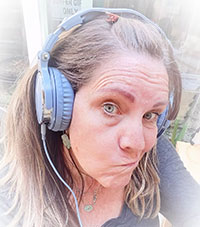
Juliana J. Bruno is a transformational coach, administrative executive, meditation teacher, and author. Bruno is the creator and host of the “I Care About You” podcast and the founder of a grassroots suicide awareness group called Social Refugees. No matter what project they take on, Bruno imbues a sense of community and understanding that encourages audiences to embrace their most authentic selves. Reasons to Live: An Interactive Guide to Healing and Overcoming Suicidal Thoughts and How to Help Others Survive is their first book.
By Giovanna Smith
Why did you feel drawn to tackling the topic of suicidal thoughts in Reasons to Live?
Suicide impacts everyone. It may not be something you personally face, but it’s likely touched the life of someone you know—a friend, a family member, a neighbor, or even a stranger whose story you come across. I have heard so many deeply personal stories about suicide, survival, and loss from people from all walks of life. Some are people I barely know, but they open up because I provide a safe space for them to share their thoughts. It’s powerful, but it also highlights a difficult truth: despite how common these struggles are, most of us feel isolated in our pain. It’s rare to find safe places to talk about suicide openly, without judgment or fear.
Not long ago, at a book signing, a woman confided in me about her battle with suicidal thoughts in high school—a burden she had carried in silence for decades, believing no one could ever understand. She was weighed down by shame and guilt, and that silence only deepened her pain. Her story resonated with me because I know what it’s like to carry that kind of hidden hurt. I, too, struggled with these thoughts during high school, a time when I felt profoundly isolated and unworthy after being sexually abused by someone I trusted. I thought suicide was the only way to escape from the pain, to cleanse myself of what I felt was irreparable.
With Reasons to Live, I wanted to create a space that would break this silence—a place where those who feel invisible, who struggle with shame or loneliness, can find understanding and community. This book is for everyone with secret stories or hidden wounds, whether related to suicide or any other dark time in life. It’s meant to show that we don’t have to face our struggles alone; healing can happen together, out in the open.
This book is also about equipping ourselves with the tools to support each other in times of crisis. We need to know how to listen, respond compassionately, and be there for one another in a world that often shies away from these conversations. I hope that readers will come away with a better understanding of both themselves and others, with the confidence to extend a hand and help someone else survive. Because this journey isn’t just about preventing suicide—it’s about supporting each other through all of life’s challenges. We all experience moments of darkness, and Reasons to Live reminds us that together, we can find a way through.
You mention that your book can connect people to a community that understands them. How important is it for those who are experiencing hopelessness to find like-minded people to talk to?
This topic is truly one that warrants thoughtful exploration, as human connection is complex, nuanced, and vital to our emotional well-being. At its core, connection is essential for anyone facing dark times. The desire to be seen, heard, and genuinely cared for is a fundamental human need. When these needs are met, they validate our worth and help us feel grounded. When these connections are missing, individuals may begin to feel isolated, unworthy, and even ashamed for wanting help. This self-judgment can compound feelings of being “broken” or fundamentally flawed, making it incredibly difficult to heal and move forward.
The difference between isolation and solitude is crucial to understand. Solitude is a conscious choice to be alone for reflection and can be deeply healing. But isolation, especially when it’s not chosen, often leads to profound loneliness. Humans are inherently social beings; we are wired for connection. Without it, we can lose our sense of purpose and struggle with feelings of worthlessness. In the absence of connection, we can start to believe we are alone in our struggles, which only deepens the emotional wounds we carry.
Discussing our deepest struggles is often seen as taboo. Many people hesitate to be open about their feelings of vulnerability and pain. Yet, something powerful happens when they encounter someone who provides a safe, non-judgmental space. It is as if a door opens, allowing them to finally unburden themselves. The simple act of being able to share one’s thoughts and feelings with someone who listens with genuine empathy can be profoundly healing. This connection can remind individuals that they are not alone, easing the weight of shame they may carry. Knowing that others have faced similar battles and found ways to overcome them can provide hope and a sense of solidarity.
Feeling judged can create a barrier that drives people further into isolation. When someone feels criticized or misunderstood, they may begin to believe that their struggles are a reflection of their worth. This perception can cause them to retreat inward, feeling disconnected from others and hesitant to reach out for help. The spiral of isolation, self-criticism, and feelings of unworthiness can become overwhelming, making it seem impossible to escape the darkness they’re experiencing. Often, they may dwell on their mistakes and challenges, viewing them as insurmountable, which only reinforces their sense of hopelessness.
Sometimes, what people need most is practical, tangible support. Small acts of kindness, like driving someone to an appointment, cooking a meal, or simply being present, can have a profound impact. These gestures may seem minor, but when done with genuine compassion, they remind the person that someone truly cares. Even if life is busy, just showing up and letting someone know they matter can be life-changing.
In the post-pandemic world, many people have found themselves more isolated than ever. The shifts in our social norms have made it easier to drift into isolation without realizing it. While alone time can be beneficial, there is a delicate balance between solitude that nurtures and loneliness that erodes well-being. As social creatures, we need each other, not just for support but for a sense of belonging and shared humanity. Yes, solitude has its place, but we must also remain vigilant about maintaining meaningful connections, reaching out to support others, and allowing ourselves to be supported in return.
Ultimately, we are stronger together, and it is through connection that we can truly heal.
Talking about suicide in an informative yet empathetic way was, I’m sure, a large undertaking. What were your greatest challenges while writing this book?
The biggest challenge in writing this book was distilling such an expansive topic into a single volume. I had to carefully decide which therapies, practices, and perspectives to include. Every choice—whether it was a therapeutic approach, a self-care technique, or a framework for understanding mental health—was made thoughtfully to ensure it offered value without overwhelming readers. I wanted to address issues like bias, the importance of seeing people within their context, and how to communicate effectively for ourselves and others.
A major consideration throughout the process was defining the audience. I’ve been asked who this book is for so many times, and my answer is that it’s for everyone touched by depression, negative self-beliefs, suffering, and mental health struggles. It’s not limited to people with suicidal thoughts or specific diagnoses. This book is for anyone, whether they’re dealing with mental illness, negative self-image, grief, feelings of loss, or simply navigating life’s challenges. The exercises and insights apply across a spectrum of experiences.
I was reminded of this universal need when my 8-year-old daughter at the time showed me a text from a friend expressing suicidal thoughts. At that moment, I wished I had a resource like this book—not just for me, but for my daughter, her friend, and their family. We found our way through as a community, though it felt clumsy at times. This experience reinforced my belief that connection and support are essential and that tools like these can guide us all, no matter our age or experience.
You can order Reasons to Live: An Interactive Guide to Healing and Overcoming Suicidal Thoughts and How to Help Others Survive on Amazon.
